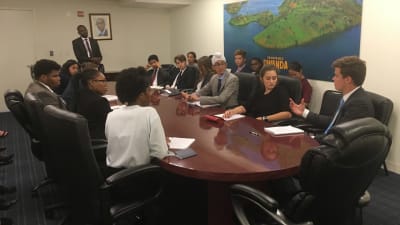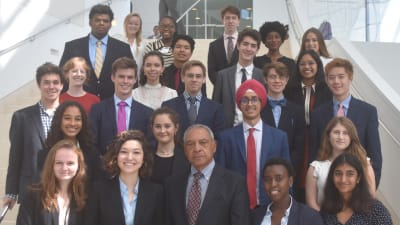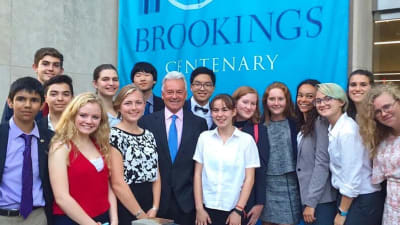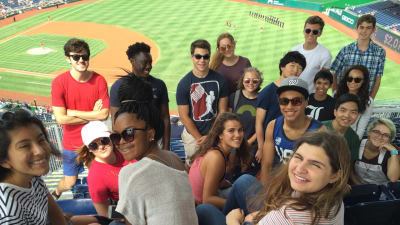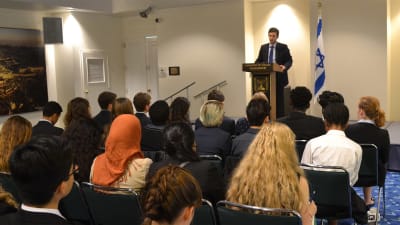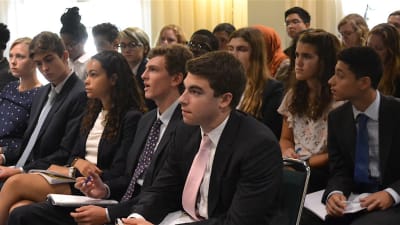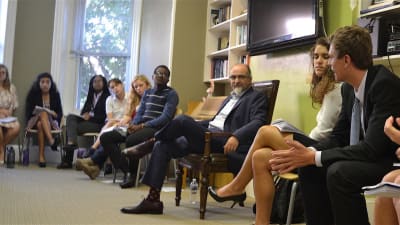Israelis, Palestinians…and peace?
The Israeli-Palestinian conflict is one of only two case studies that SEGL has taught every semester/summer session since its inception. Each cohort of students views the conflict through a different lens: whether the Gaza War, or renewed hope for negotiations, there is always something in the news. This semester the picture is more complicated than ever: the war in Syria, the Iran nuclear deal, purported cool relations between President Obama and Prime Minister Netanyahu, and renewed clashes on Jerusalem’s Temple Mount. Against this backdrop, our students heard an overview of the conflict’s history on Monday. Stepping through the mine fields of loaded language and divergent narratives, we attempted to pin down key events and key negotiation sticking points (settlements, right of return, Jerusalem, security guarantees, etc.) and the various interpretations others have offered about them. The students filled the morning with excellent questions and heard complex answers.
On Wednesday we traveled to meet with with Jonathan Kessler, Leadership Development Director at the American Israel Public Affairs Committee (AIPAC). AIPAC, arguably one of the most influential lobbying groups in the country, has its high-security headquarters north of Judiciary Square in DC. Kessler’s articulate perspective got students thinking. What are the best ways for U.S. citizens who support Israel to do so? What do Israelis think about the United States’ role?
On Friday, we met with 2015 Golden Mug Award winner Ghaith Al-Omari. A former top advisor to Palestinian President Mahmoud Abbas, Al-Omari was at the table for the Palestinians during Camp David II and has served as Director of the International Relations Department in the Office of the Palestinian President. His thoughts, delivered in the organized prose of the Oxford-educated lawyer that he is, made students think deeply. Is the crisis best thought of, not as an arranged marriage, but as a complicated divorce settlement? What is the best way for college students to work on this issue (he is not a fan of the “Boycott, Divestment, Sanction” movement that has gained momentum on campuses lately)?
Later this semester we will finish our case study by meeting with Aaron David Miller, a Woodrow Wilson Center scholar who has advised six different Secretaries of State on the conflict. Miller was a U.S. negotiator at the Camp David II meetings, just as Al-Omari was, and his perspective is always particularly poignant for students. More on that in December.
Speaking of finishing previous case studies, on Wednesday we also met with 2014 Golden Mug Award winner Laura Lane. We spoke with her at UPS’s DC headquarters, where Lane currently serves as President of Global Public Affairs. In 1994, however, she was a 27 year-old Foreign Service officer at the U.S. Embassy, responsible for evacuating each of the hundreds of Americans hoping to escape the genocide. She did so successfully, except for one person: Carl Wilkens (with whom we spoke last week) who refused the U.S. government’s evacuation directive.
Lane spoke passionately about her experiences (including naming hundreds of Rwandans “honorary Americans” so they could escape with the U.S. convoy out of the country) and her choice to follow orders and close the U.S. Embassy. Though many would call her actions heroic, her regret for not staying is still fresh, and the students leaned in as she spoke about following one’s own moral compass, even when authority urges otherwise.
One other note from this week: on Tuesday afternoon, the students took part in an SEGL classic–the Leadership Styles exercise. With two questions (“Is your first instinct to observe or speak when in a group making a decision?” “When you make important decisions, do you decide with your head or your heart?”) the students divided themselves up into four classic leadership styles: Driver, Expressive, Analyst, and Supportive. Each group completed the same given task, but ended up with very different results; the ensuing conversation revealed, among other insights, the importance of having each style reflected in any decision making group (or, perhaps, in any decision making leader!).
Next up: speechwriting with 2013 Golden Mug Award winner Lissa Muscatine, Hillary Clinton’s longtime top speechwriter.
